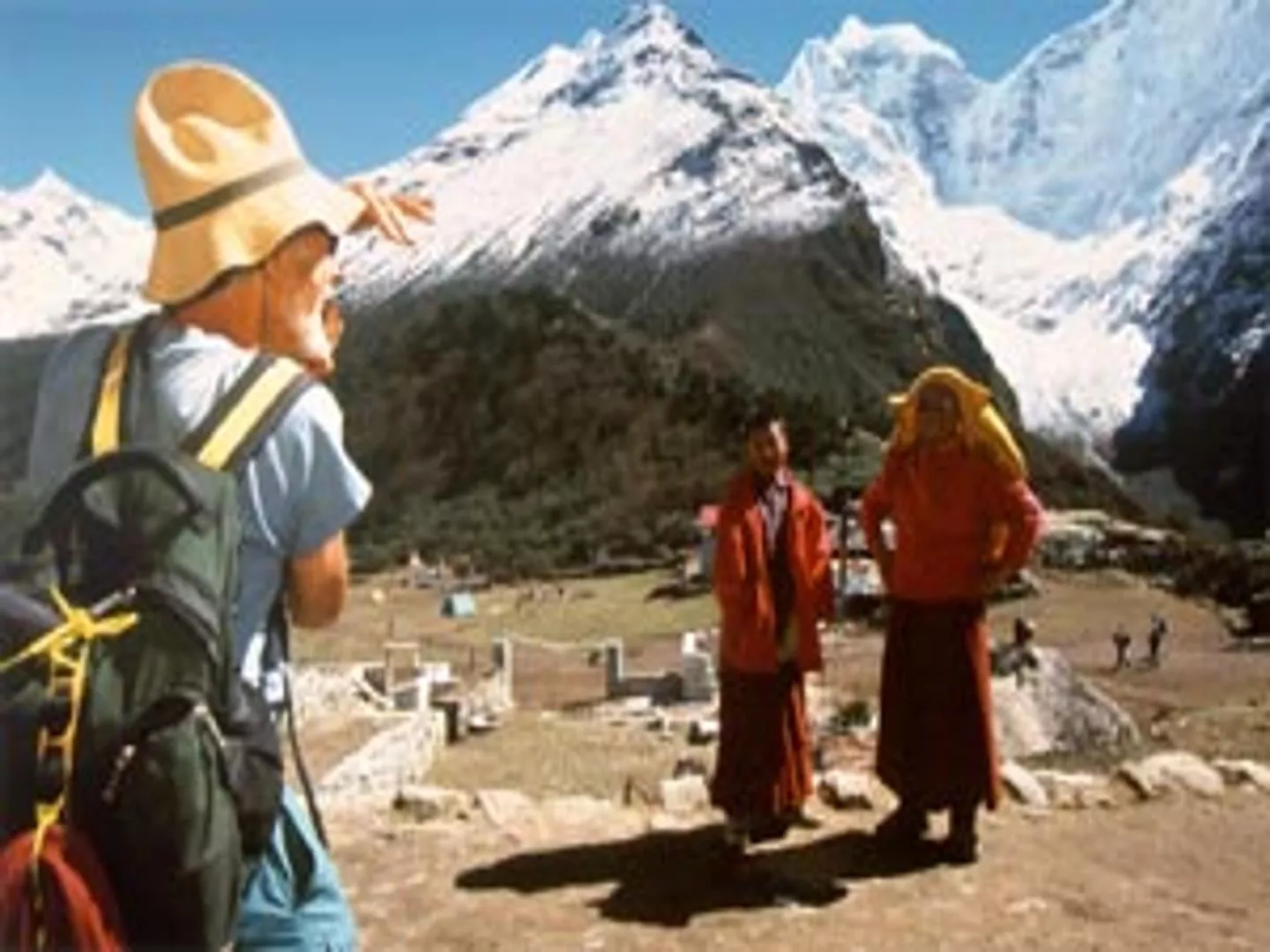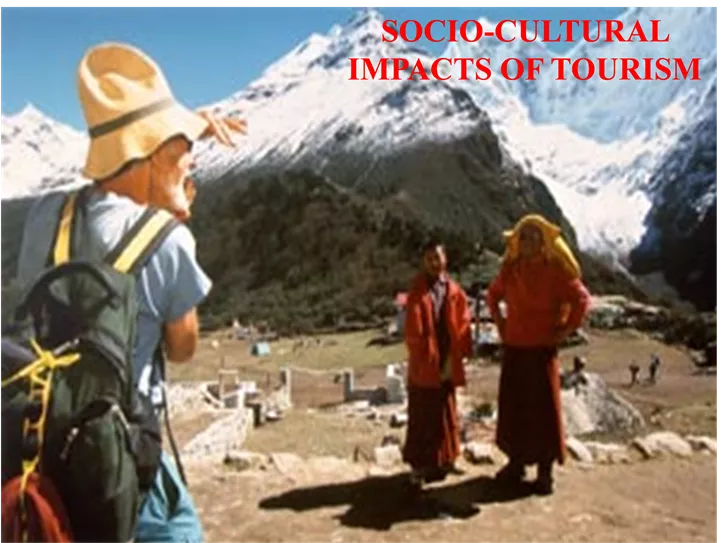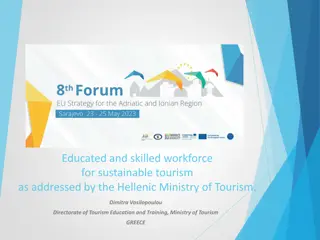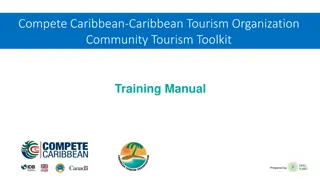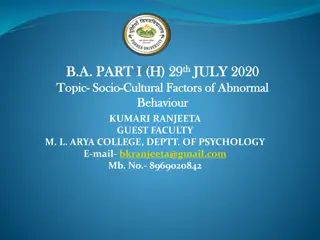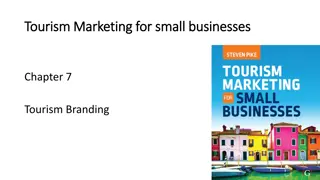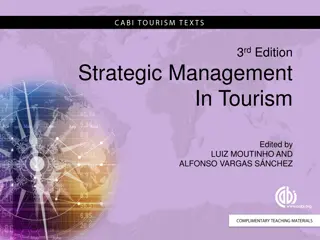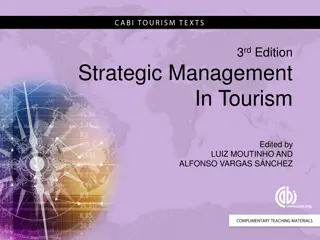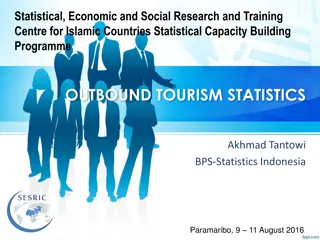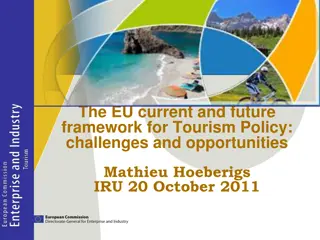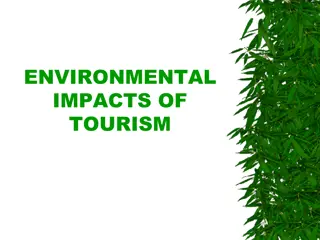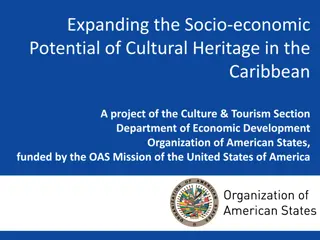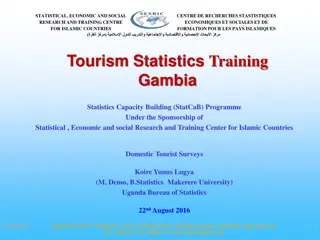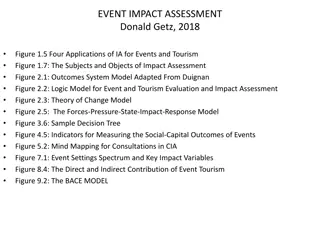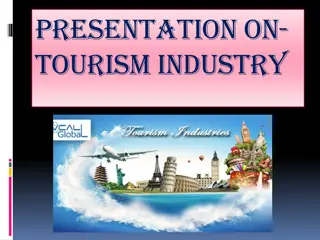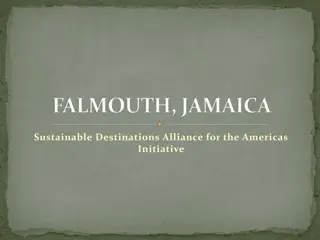Socio-Cultural Impacts of Tourism
The socio-cultural impacts of tourism on host communities can be both positive and negative. Tourism can influence local identities, values, and traditions, leading to changes in behavior and community structures. While tourism can create job opportunities and foster cultural pride, it may also result in the commodification, standardization, and loss of authenticity of indigenous cultures. These impacts are complex and subjective, affecting communities in various ways.
Download Presentation

Please find below an Image/Link to download the presentation.
The content on the website is provided AS IS for your information and personal use only. It may not be sold, licensed, or shared on other websites without obtaining consent from the author.If you encounter any issues during the download, it is possible that the publisher has removed the file from their server.
You are allowed to download the files provided on this website for personal or commercial use, subject to the condition that they are used lawfully. All files are the property of their respective owners.
The content on the website is provided AS IS for your information and personal use only. It may not be sold, licensed, or shared on other websites without obtaining consent from the author.
E N D
Presentation Transcript
SOCIO-CULTURAL IMPACTS OF TOURISM IMPACTS OF TOURISM SOCIO-CULTURAL
SOCIO SOCIO- -CULTURAL IMPACTS OF TOURISM CULTURAL IMPACTS OF TOURISM INTRODUCTION The socio-cultural impacts of tourism described here are the effects on host communities of direct and indirect relations with tourists, and of interaction with the tourism industry. For a variety of reasons, host communities often are the weaker party in interactions with their guests and service providers, leveraging any influence they might have. These influences are not always apparent, as they are difficult to measure, depend on value judgments and are often indirect or hard to identify.
SOCIO SOCIO- -CULTURAL IMPACTS OF TOURISM CULTURAL IMPACTS OF TOURISM INTRODUCTION Impacts arise when tourism brings changes in value systems / behaviour, threatening indigenous identity. Changes often occur in community structure, family relationships, collective traditional life styles, ceremonies and morality. But tourism can also generate positive impacts as it can serve as a supportive force for peace, foster pride in cultural traditions and help avoid urban relocation by creating local jobs. Socio-cultural impacts are ambiguous: the same objectively described impacts are seen as beneficial by some groups and as negative by others.
NEGATIVE SOCIO-CULTURAL IMPACTS OF TOURISM CHANGE OR LOSS OF INDIGENOUS IDENTITY OR VALUES Tourism can cause change / loss of local identity and values by: 1. 2. 3. 4. COMMODIFICATION STANDARDISATION LOSS OF AUTHENTICITY / STAGED AUTHENTICITY ADAPTATION TO TOURIST DEMANDS
NEGATIVE SOCIO NEGATIVE SOCIO- -CULTURAL IMPACTS OF TOURISM CULTURAL IMPACTS OF TOURISM Commodification Tourism can turn local cultures into commodities when religious rituals, traditional ethnic rites and festivals are reduced and sanitized to conform to tourist expectations, resulting in what has been called "reconstructed ethnicity." Once a destination is sold as a tourism product, and the tourism demand for souvenirs, arts, entertainment and other commodities begins to exert influence, basic changes in human values may occur. Sacred sites and objects may not be respected when they are perceived as goods to trade.
NEGATIVE SOCIO NEGATIVE SOCIO- -CULTURAL IMPACTS OF TOURISM CULTURAL IMPACTS OF TOURISM Standardization Destinations risk standardization in the process of satisfying tourists' desires for familiar facilities. While landscape, accommodation, food and drinks, etc., must meet the tourists' desire for the new and unfamiliar, they must at the same time not be too new or strange because few tourists are actually looking for completely new things. Tourists often look for recognizable facilities in an unfamiliar environment, like well-known fast-food restaurants and hotel chains.
NEGATIVE SOCIO NEGATIVE SOCIO- -CULTURAL IMPACTS OF TOURISM CULTURAL IMPACTS OF TOURISM Loss of authenticity and staged authenticity Adapting cultural expressions to the tastes of tourists or even performing shows as if they were "real life" constitutes "staged authenticity". As long as tourists just want a glimpse of the local atmosphere, a quick glance at local life, without any knowledge or even interest, staging will be inevitable.
NEGATIVE SOCIO NEGATIVE SOCIO- -CULTURAL IMPACTS OF TOURISM CULTURAL IMPACTS OF TOURISM Adaptation to tourist demands Tourists want souvenirs, arts, crafts, and cultural manifestations, and in many tourist destinations, craftsmen have responded to the growing demand, and have made changes in design of their products to bring them more in line with the new customers' tastes. While the interest shown by tourists also contributes to the sense of self-worth of the artists, and helps conserve a cultural tradition, cultural erosion may occur due to the commodification of cultural goods.
NEGATIVE SOCIO NEGATIVE SOCIO- -CULTURAL IMPACTS OF TOURISM CULTURAL IMPACTS OF TOURISM Culture clashes Because tourism involves movement of people to different geographical locations, and establishment of social relations between people who would otherwise not meet, cultural clashes can take place as a result of differences in cultures, ethnicity, religion, values, lifestyles, languages, and levels of prosperity. The result can be anoverexploitationof the social carrying capacity (limits of acceptable change in the social system inside or around the destination) and cultural carrying capacity (limits of acceptable change in the culture of the host population) of the local community. The attitude of local residents towards tourism development may unfold through the stages of euphoria, where visitors are very welcome, through apathy, irritation and potentially antagonism, when anti-tourist attitudes begin growing among local people.
NEGATIVE SOCIO NEGATIVE SOCIO- -CULTURAL IMPACTS OF TOURISM CULTURAL IMPACTS OF TOURISM Cultural clashes may further arise through: Economic inequality Many tourists come from societies with different consumption patterns and lifestyles than what is current at the destination, seeking pleasure, spending large amounts of money and sometimes behaving in ways that even they would not accept at home. One effect is that local people that come in contact with these tourists may develop a sort of copying behaviour, as they want to live and behave in the same way. Especially in less developed countries, there is likely to be a growing distinction between the 'haves' and 'have-nots', which may increase social and sometimes ethnic tensions. In resorts in destination countries such as Jamaica, Indonesia or Brazil, tourism employees with annual salaries of US$ 1,500 spend their working hours in close contact with guests whose yearly income is well over US$ 80,000.
NEGATIVE SOCIO NEGATIVE SOCIO- -CULTURAL IMPACTS OF TOURISM CULTURAL IMPACTS OF TOURISM Irritation due to tourist behaviour Tourists often, out of ignorance or carelessness, fail to respect local customs and moral values. When they do, they can bring about irritation and stereotyping. They take a quick snapshot and are gone, and by so acting invade the local peoples' lives.
NEGATIVE SOCIO-CULTURAL IMPACTS OF TOURISM In many Muslim countries, strict standards exist regarding the appearance and behaviour of Muslim women, who must carefully cover themselves in public. Tourists in these countries often disregard or are unaware of these standards, ignoring the prevalent dress code, appearing half-dressed (by local standards) in revealing shorts, skirts or even bikinis, sunbathing topless at the beach or consuming large quantities of alcohol openly. Besides creating ill-will, this kind of behavior can be an incentive for locals not to respect their own traditions and religion anymore, leading to tensions within the local community. The same types of culture clashes happen in conservative Christian communities in Polynesia, the Caribbean and the Mediterranean.
NEGATIVE SOCIO-CULTURAL IMPACTS OF TOURISM Job level friction In developing countries especially, many jobs occupied by local people in the tourist industry are at a lower level, such as housemaids, waiters, gardeners and other practical work, while higher-paying and more prestigious managerial jobs go to foreigners or "urbanized" nationals. Due to a lack of professional training, as well as to the influence of hotel or restaurant chains at the destination, people with the know- how needed to perform higher level jobs are often recruited from other countries. This may cause friction and irritation and increases the gap between the cultures. Even in cases where tourism "works", in the sense that it improves local economies and the earning power of local individuals, it cannot solve all local social or economic problems. Sometimes it substitutes new problems for old ones.
NEGATIVE SOCIO-CULTURAL IMPACTS OF TOURISM Ethical issues Crime generation Crime rates typically increase with the growth and urbanization of an area, and growth of mass tourism is often accompanied by increased crime. The presence of a large number of tourists with a lot of money to spend, and often carrying valuables such as cameras and jewellery, increases the attraction for criminals and brings with it activities like robbery and drug dealing. Repression of these phenomena often exacerbates social tension. In Rio de Janeiro, Brazil, tourists staying in beachside five star resorts close to extremely poor communities in hillside "favelas" are at risk of pickpockets and stick-ups. Security agents, often armed with machine guns, stand guard nearby in full sight, and face aggressive reactions from locals who are often their neighbours when they go home.
NEGATIVE SOCIO-CULTURAL IMPACTS OF TOURISM Child labour Studies show that many jobs in the tourism sector have working and employment conditions that leave much to be desired: long hours, unstable employment, low pay, little training and poor chances for qualification. In addition, recent developments in the travel and tourism trade (liberalisation, competition, concentration, drop in travel fares, growth of subcontracting) seem to reinforce the trend towards more precarious, flexible employment conditions. For many such jobs young children are recruited, as they are cheap and flexible employees.
NEGATIVE SOCIO-CULTURAL IMPACTS OF TOURISM Prostitution and sex tourism The commercial sexual exploitation of children and young women has paralleled the growth of tourism in many parts of the world. Though tourism is not the cause of sexual exploitation, it provides easy access to it. Tourism also brings consumerism to many parts of the world previously denied access to luxury commodities and services. The lure of this easy money has caused many young people, including children, to trade their bodies in exchange for T-shirts, personal stereos, bikes and even air tickets out of the country. In other situations children are trafficked into the brothels on the margins of the tourist areas and sold into sex slavery, very rarely earning enough money to escape.
http://www.upworthy.com/who- doesnt-like-to-watch-half-naked- girls-dancing-these-guys-after- they-see-why-its-happening
NEGATIVE SOCIO-CULTURAL IMPACTS OF TOURISM Prostitution and sex tourism The UN has defined child sex tourism as "tourism organised with the primary purpose of facilitating the effecting of a commercial sexual relationship with a child". Certain tourism destinations have become centres for this illegal trade, frequented by paedophiles and supported by networks of pimps, taxi drivers, hotel staff, brothel owners, entertainment establishments, and tour operators who organize package sex tours. At the international level, there are agents who provide information about particular resorts where such practices are commonplace. Although sexual exploitation of children is a worldwide phenomenon, it is more prevalent in Asia than elsewhere.
HOW TOURISM CAN CONTRIBUTE TO SOCIO-CULTURAL CONSERVATION Tourism can contribute to positive developments, not just negative impacts. It has the potential to promote social development through employment creation, income redistribution and poverty alleviation. Other potential positive impacts of tourism include: Tourism as a force for peace Strengthening communities Facilities developed for tourism can benefit residents Revaluation of culture and traditions Encourages civic involvement and pride
HOW TOURISM CAN CONTRIBUTE TO SOCIO-CULTURAL CONSERVATION Tourism as a force for peace Travelling brings people into contact with each other and, as tourism has an educational element, it can foster understanding between peoples and cultures and provide cultural exchange between hosts and guests. Because of this, the chances increase for people to develop mutual sympathy and understanding and to reduce their prejudices. For example, jobs provided by tourism in Belfast, Northern Ireland, are expected to help demobilize paramilitary groups as the peace process is put in place. In the end, sympathy and understanding can lead to a decrease of tension in the world and thus contribute to peace.
HOW TOURISM CAN CONTRIBUTE TO SOCIO-CULTURAL CONSERVATION Strengthening communities Tourism can add to the vitality of communities in many ways. One example is that events and festivals of which local residents have been the primary participants and spectators are often rejuvenated and developed in response to tourist interest. The jobs created by tourism can act as a vital incentive to reduce emigration from rural areas. Local people can also increase their influence on tourism development, as well as improve their job and earnings prospects, through tourism-related professional training and development of business and organizational skills.
HOW TOURISM CAN CONTRIBUTE TO SOCIO-CULTURAL CONSERVATION The San of Namibia and southern Africa and the aboriginal peoples of Australia have recently regained management or ownership of traditional national park lands and conservancies, operating eco- lodges and serving as guides and rangers while maintaining their heritage. E.g. Gudigwa Camp, Botswana
HOW TOURISM CAN CONTRIBUTE TO SOCIO-CULTURAL CONSERVATION Facilities developed for tourism can benefit residents As tourism supports the creation of community facilities and services that otherwise might not have been developed, it can bring higher living standards to a destination. Benefits can include upgraded infrastructure, health and transport improvements, new sport and recreational facilities, restaurants, and public spaces as well as an influx of better- quality commodities and food. Revaluation of culture and traditions Tourism can boost the preservation and transmission of cultural and historical traditions, which often contributes to the conservation and sustainable management of natural resources, the protection of local heritage, and a renaissance of indigenous cultures, cultural arts and crafts.
HOW TOURISM CAN CONTRIBUTE TO SOCIO-CULTURAL CONSERVATION "Tourism has forced the Balinese to reflect on their artistic output as just one cultural identifier. The presence of visitors who continually praise Balinese art and culture has given people a kind of confidence and pride in their art, and made them truly believe that their culture is glorious and thus worthy of this praise and therefore justly admired. This realization removed any possibility in the people's mind that their art was in any way inferior to the art of advanced nations, and plays an important role in conserving and developing the art in general.".
HOW TOURISM CAN CONTRIBUTE TO SOCIO-CULTURAL CONSERVATION Tourism encourages civic involvement and pride Tourism also helps raise local awareness of the financial value of natural and cultural sites and can stimulate a feeling of pride in local and national heritage and interest in its conservation. More broadly, the involvement of local communities in tourism development and operation appears to be an important condition for the conservation and sustainable use of biodiversity.
HOW TOURISM CAN CONTRIBUTE TO SOCIO-CULTURAL CONSERVATION CONCLUSION These are some positive consequences of tourism that can arise only when tourism is practiced and developed in a sustainable and appropriate way. Involving the local population is essential. A community involved in planning and implementation of tourism has a more positive attitude, is more supportive and has a better chance to make a profit from tourism than a population passively ruled - or overrun - by tourism. One of the core elements of sustainable tourism development is community development, which is a process and a capacity to make decisions that consider the long-term economy, ecology and equity of all communities.

 undefined
undefined

